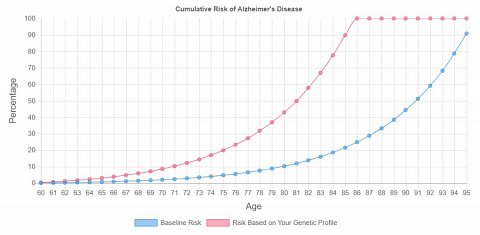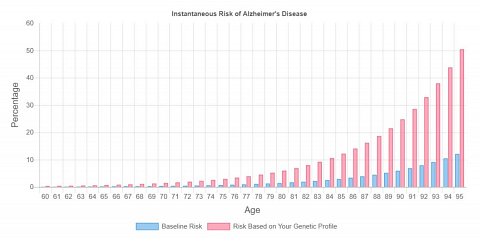-
Personalized Alzheimer’s Disease Risk
review on September 3, 2018
by Rebecca Fishwick

At a Glance
Summary
The ‘Personalized Alzheimer’s Disease Risk’ test by Dash Genomics provided insights into my risk of developing Alzheimer’s compared to a group of more than 54,000 people studied by two Californian universities. Though they provided links to the research, I would have liked to have seen a list of the individual genetic variants tested, and which ones I had that put me at risk.
The test may give some idea of the genetic risk of developing Alzheimer’s, though it is not diagnostic or medically validated. Still, as forewarned is forearmed, the results could motivate people to change their lifestyle for the better.
Full Review
Dash Genomics is partnered with HealthLytix, a precision health company based in San Diego, California. The algorithm used by Dash Genomics for their genetic Alzheimer’s test was developed by HealthLytix, and based on research from the University of California San Diego and the University of California San Francisco.
Product Expectations
The Dash Genomics website was pretty much made to purpose. Currently, they offer only one DNA test: the ‘Personalized Alzheimer’s Disease Risk’ test.
I could take the test using my 23andMe or AncestryDNA data. Their algorithm model would use this data to help me understand my risk of developing Alzheimer’s using research from UC San Diego and UC San Francisco, calculating my personalized risk based on both age and genetics.
There were links to the research used by HealthLytix in developing the algorithm, which led to an online journal describing a study conducted on a cohort of about 54,000 people, some of which had developed Alzheimer’s, and others who formed the control group. By studying the genetic information of both groups, the researchers developed a “polygenic hazard score” – i.e., a risk score for developing Alzheimer’s.
I saw that my Alzheimer’s Disease Risk report would contain three to four sections, depending on my age. The “Summary” section would contain the most relevant information about my Alzheimer’s risk. This would include both cumulative risk by my current age, and my instantaneous risk; since I’m younger than 60, these risks would be based on what my scores were expected to be by the age of 65. There would also be an “AZ50Age”, which I hoped would be explained in the report!
The “Cumulative Risk” section would show how my risk of developing Alzheimer’s changes or increases over time according to my genetics and age. Their algorithm would compare my genetic data to that of those in the research cohort.
The “Instantaneous Risk” section would show my likelihood of developing Alzheimer’s at any given age, comparing my information to the average for the different age groups.
The last section was “5-Year Risk”, which was only available for people older than 60. This would predict the likelihood of developing Alzheimer’s in the next five years based on current age and genetic profile.
In the FAQs, I read that they looked at the APOE gene – which has been linked to Alzheimer’s – as well as other genes. They didn’t provide a complete list, but linked back to the study they used.
Ordering Experience
Ordering the test through the Dash Genomics website was very easy. I was required to give my full name, date of birth, email address, and a password. I needed to confirm that I have a genomic data file from AncestryDNA or 23andMe (otherwise the purchase would be pointless!), confirm I was at least 18 years old, and agree to the Terms and Conditions and Privacy Policy, and agree that I understood that the test is not diagnostic in nature, and that I had read and consented to the Limitations and Disclaimers.
I took a look through their policies. I had seen their Limitations and Disclaimers already, which were clearly visible on their website. The Limitations explained that the test was not diagnostic or medically validated, that my data from 23andMe or AncestryDNA was not complete and may be flawed, that due to the uniqueness of each person’s genome the model may not be accurate for me, and that the model used people who were predominantly US-based and of Caucasian ancestry.
The Disclaimers stated that the research model related only to Late-Onset Alzheimer’s and didn’t extend to other forms of dementia, that research was still in its early stages, and that there is currently no cure for Alzheimer’s, meaning that it may be distressing to learn that you have a high risk of developing it.
The Terms and Conditions contained similar information to the Limitations and Disclaimers, as well as terms similar to those found in the Terms of Service for most websites.
From the Privacy Policy I learned that Dash Genomics used cookies and Google Analytics to monitor web behavior. They may also share my genetic information with researchers, though they would not attach my name to this information unless I consented. I might also be contacted about studies I may want to take part in. If I wished to close my account, I could email them at the address provided, but they may still retain my information (including genetic information).
I was able to order the report using a credit or debit card. Following my purchase, I received an email asking me to verify my account. I could upload my genetic data file immediately after purchasing. (I initially tried uploading a .zip file, but this wasn’t supported. I next uploaded a .txt file, which worked fine.)
It took only a couple of minutes for my data file to be uploaded and processed. I was then able to view my report.
The Results
My report was spread over a single webpage, and was pretty straightforward in layout. It again reiterated the Limitations and Disclaimers. There was a note about the science, which again referenced the study by UC San Diego and UC San Francisco.
Results Section: Analysis Summary
The first section summarized their analysis of my genetic information (shown below).

My Analysis Summary.
As you can see, they provided my cumulative risk by the age of 65, which was slightly above 3%, meaning I had only a 3% chance of having developed Alzheimer’s by the age of 65. My instantaneous risk at age 65 was 0.71%, meaning that I had only a 0.71% chance of developing Alzheimer’s during my 65th year.
In the information, I read that the AZ50Age was the age at which my cumulative risk score for developing Alzheimer’s would exceed 50%, which for me was 82.
Result Section: Cumulative Risk
The next section showed my cumulative risk of developing Alzheimer’s overtime. A graph compared my cumulative risk to that of the research cohort (shown below).

My Cumulative Risk Graph.
There were a couple of tables below this graph, detailing the baseline risk for developing Alzheimer’s and my own cumulative genetic risk for each year between the ages of 60 and 95.
It seemed that by age 81, it would be a coin’s toss whether I would have developed Alzheimer’s or not – at least, according to their model. As you can see on the graph, my cumulative risk was pretty much 50%, and the table gave it as 49.86%.
I’d already learned from the summary section that the age at which my cumulative risk would exceed 50% was 82, and from the table I found that my risk had leapt to 57.82%. From there, things went downhill pretty quickly. From age 86 onward, my cumulative risk of developing Alzheimer’s was 99.999%.
This wasn’t exactly thrilling news. I’d known what I was in for when I agreed to the Disclaimers and so on, but still, it wasn’t a welcome revelation that I had such an increased likelihood of developing Alzheimer’s. At 86, it was pretty much a certainty that I would have developed Alzheimer’s, while the baseline risk – the average for most people – was only 24.91% (approximately one in four).
Still, they say forewarned is forearmed, and it’s possible that a healthy lifestyle may reduce the risk of cognitive decline.
Results Section: Instantaneous Risk
The instantaneous risk section showed my risk of developing Alzheimer’s at any given age between 60 and 95, assuming I hadn’t yet developed it. A graph compared my instantaneous risk with the research cohort (shown below).

My Instantaneous Risk Graph.
These instantaneous risks weren’t as high as you might think, since the percentages on the left only went up to 60%, and so my maximum instantaneous risk was about 50%.
Unlike the cumulative risk, the instantaneous risk didn’t show my risk of developing Alzheimer’s altogether, only the likelihood of developing it at certain ages if I hadn’t yet already. For instance, if I hadn’t developed Alzheimer’s by the age of 90, then my instantaneous risk of developing it at that age was 24.78%. This didn’t mean I had a 25% chance of having Alzheimer’s at that age, only of developing it in that year of my life.
Results Section: Next Steps
Since I wasn’t old enough to have a “5-Year Risk” section in my report, the report ended with “Next Steps”. This didn’t provide any advice for avoiding Alzheimer’s (as the section name might suggest), but reiterated that the analysis hadn’t been validated for medical or diagnostic use, and that the information provided should not be considered definitive in terms of Alzheimer’s Disease risk.
There were links to learn more about Alzheimer’s, and suggestions that I consult with a medical professional before taking any actions regarding my health, or consult with a genetic counsellor.
Summary
The ‘Personalized Alzheimer’s Disease Risk’ test by Dash Genomics provided insights into my risk of developing Alzheimer’s compared to a group of more than 54,000 people studied by two Californian universities. Though they provided links to the research, I would have liked to have seen a list of the individual genetic variants tested, and which ones I had that put me at risk.
The test may give some idea of the genetic risk of developing Alzheimer’s, though it is not diagnostic or medically validated. Still, as forewarned is forearmed, the results could motivate people to change their lifestyle for the better.
Please note we were invited to take this test free of charge.


